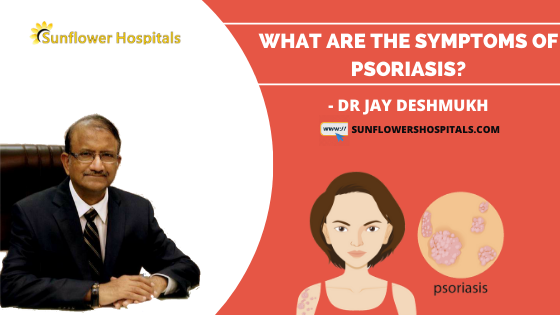Psoriasis is a skin disease that causes red, Itchy scaly patches, most commonly on the knees, elbows, trunk, and scalp. This is a common skin ailment with no cure. It goes through phases of remissions and relapses flaring for weeks or months, then subsiding for a few months. Excellent treatment options are available to manage symptoms.
What are the symptoms of psoriasis?
The symptoms may vary from person to person. Common features include itching, burning or soreness, red patches of skin covered with thick silvery scales. The skin may become dry and cracked that may bleed on touch. The nails may become thickened or may become pitted. Sometimes the nails can become ridged. In addition in some, the joints can become swollen and stiff and become painful. Which are the commonly affected areas? The commonly affected areas include lower back, elbows, knees, legs, soles of feet, scalp, face, and palms. Most types of psoriasis go through cycles of exacerbation for a few weeks or months followed by remission for a few weeks or months.
What are the different types of psoriasis?
There are several types of plaque psoriasis is most common. Dry, red, painful scaly and silvery patches are common. They appear on elbows, scalp, knees, and low back. The other types are nail psoriasis, Guttate psoriasis. Guttate type is more common in children following a sore throat infection. It presents with small, drop-shape scaling lesions on the trunk arms or legs. Inverse psoriasis affects the skin fold of groin, buttocks, and breasts. This is triggered by fungal infections.
What is pustular and very-tbrodermk psoriasis?
In pustular type, there is a pus-filled lesion that occurs in wide patches or in small patches on the palms or soles. The least common is the Erythrodermic form that covers the entire body. This can be a red peeling rash that can burn or itch intensely. What is psoriatic arthritis? In this variety of psoriasis, the joints of the hands or knees or toes can be involved causing severe pain and swelling. At times, the low back joints of the spinal joints can be involved too. The degree of skin involvement does not go parallel to joint involvement. However, scalp psoriasis is associated with arthritis in many cases. These joints involvement needs to be differentiated from Rheumatoid arthritis.
What causes psoriasis?
Though the exact factors that cause psoriasis are elusive, genetic factors play a major role. Other family members or generations are known to be affected. The immune system that looks after the turnover of skin cells is known to malfunction. Psoriasis is not contagious. What are the factors known to trigger psoriasis? The disease may be triggered by an environmental factor. Sore throat or other skin infection can trigger psoriasis. Cold dry conditions, injuries to the skin, stressful states, smoking and exposure to second-hand smoke, heavy alcohol consumption, certain anti-malaria drugs, lithium, and certain blood pressure-lowering medications can trigger psoriasis. Rapid withdrawal of steroids can also trigger psoriasis.
If you have psoriasis, can that lead to other medical conditions?
You at a greater risk of having arthritis, eye conditions like conjunctivitis. blepharitis and uveitis. High blood pressure, obesity type 2 diabetes and cardiovascular diseases that are commonly associated with psoriasis. Depression and low self-esteem are quite common. Other autoimmune diseases like celiac disease, multiple sclerosis, and Crohn’s dis-ease are also associated.
What is the treatment? The therapy is aimed at reducing skin cells from growing rapidly. Options include creams, ointments, shampoos, phototherapy, and oral or injectable medicine. Topical medications include Corticosteroids, Vitamin D analogs, Retinoids, Calcineurin inhibitors, Salicylic acid, Coal tar, and Anthralin. Goeckerman therapy includes coal tar treatment with light therapy.
What about light therapy?
Exposing the involved skin to a controlled amount of sunlight or artificial light is done. Sunlight, Ultraviolet B broadband or narrowband, psoralen with Ultraviolet A known as PUMA therapy, and Excimer laser are all used.
What about oral or inject-ed medications?
Steroids, Retinoids, Methotrexate, Cyclosporine are commonly used. Biologics are used in severe forms of psoriasis. They are expensive, in injectable forms but are also very effective. They can unmask tuberculosis. These include Etanercept, Infliximab, Adalimumab, etc.
What about alternative medicine?
Special diets, creams, dietary supplements, and herbs are popular. None have definitely been proved to be effective. But some alternative therapies are safe and may reduce itching and scaling in some people. These are useful in mild to moderate psoriasis. Some may be useful to reduce stress. These include Aloe extract creams, fish oil supplements, Oregon grapes, and essential oils. Taking bath daily with bath oils and Epsom salt, using moisturizer, covering the affected areas overnight, exposure of skin to small amounts of sunlight, applying medicated ointments, avoiding stress and psoriasis triggers like infections, injuries to the skin, excess alcohol and to strive to maintain a stress-free healthy lifestyle is important.


